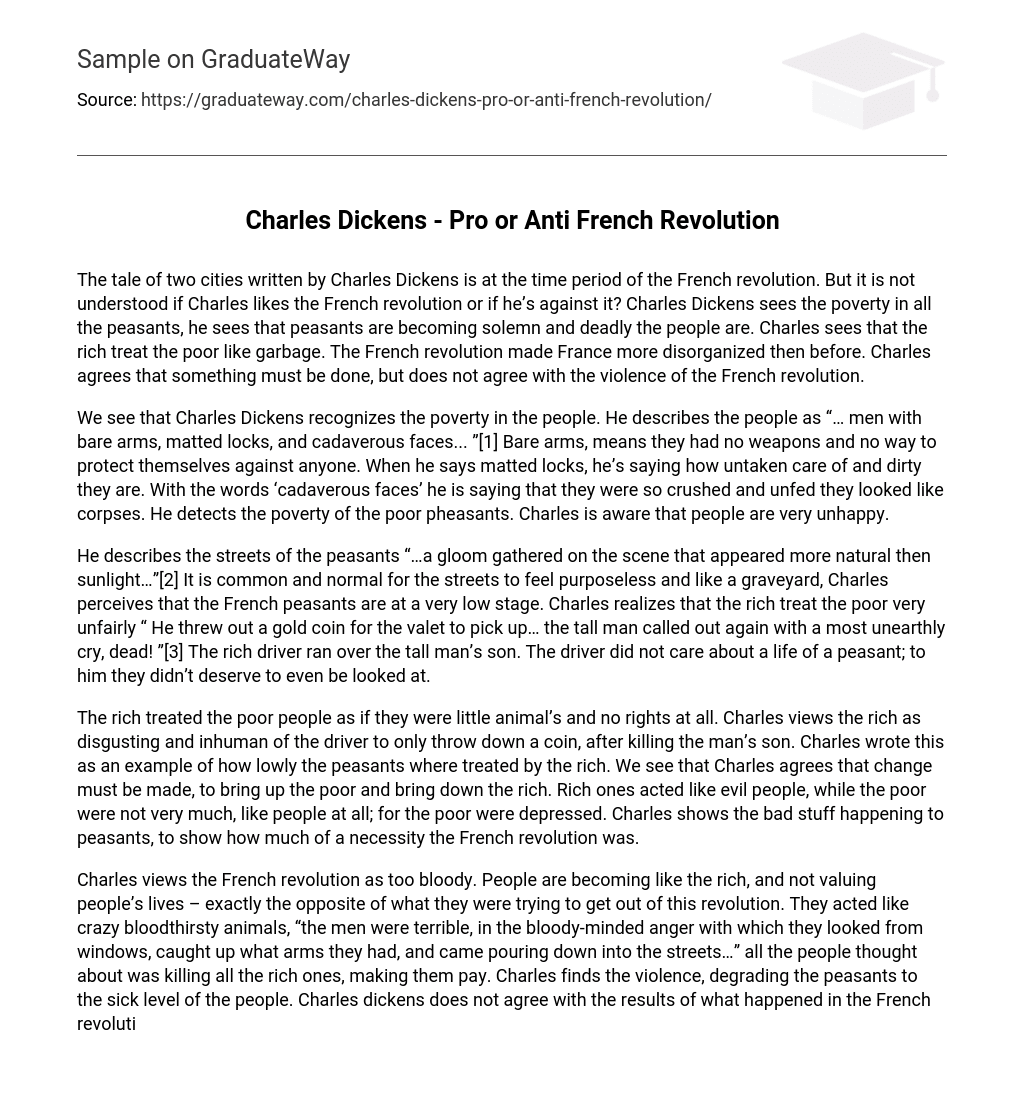The author Charles Dickens explores the French revolution in his novel “A Tale of Two Cities.” It is unclear whether he supports or opposes this historical event. Dickens observes the poverty-stricken lives of the peasants and their deteriorating state of being. He also witnesses the harsh treatment of the poor by the wealthy. Despite acknowledging the need for change, Dickens does not condone the violent nature of the French revolution, which caused further chaos in France.
We see that Charles Dickens acknowledges the poverty of the people. He portrays them as individuals with bare arms, matted locks, and cadaverous faces[1]. Bare arms signify that they had no weapons and lacked means to defend themselves. By referring to matted locks, Dickens implies that their hair was neglected and dirty. Through the phrase ‘cadaverous faces’, he indicates that they were so crushed and undernourished that they resembled corpses. He perceives the poverty among the destitute pheasants. Charles is conscious of the extreme unhappiness experienced by these individuals.
He describes the streets of the peasants as having a gloomy atmosphere that is more natural than sunlight. It is typical for these streets to feel purposeless and resemble a graveyard. Charles perceives the French peasants to be at a very low stage. He realizes that the rich treat the poor in an extremely unfair manner. For instance, when the tall man’s son was accidentally run over by a rich driver, the driver callously threw out a gold coin for his valet to pick up. The tall man called out with an unearthly cry, indicating that his son was dead. The driver displayed complete disregard for the life of a peasant, viewing them as unworthy of even being acknowledged.
The rich treated the poor as if they were mere animals, devoid of any rights. Charles considers it abhorrent and cruel that the wealthy would only offer a coin after taking someone’s life, using this incident to exemplify how peasants were degraded by the rich. Charles acknowledges the need for change in order to uplift the poor and diminish the power held by the wealthy. The affluent acted like malevolent beings, while the impoverished were treated as though they lacked humanity, resulting in them feeling oppressed. Charles emphasizes the unfortunate ordeals endured by peasants to highlight the pressing necessity for the French revolution.
According to Charles, the French revolution was excessively violent, causing people to emulate the wealthy and devalue human lives. This stands in contrast to the original goals of the revolution. Charles perceives the participants as savage and bloodthirsty, exemplified by their angry gazes from windows, arming themselves, and flooding the streets. The primary focus was on killing the wealthy and exacting revenge. This violence is seen by Charles as demeaning the peasants, sinking them to a sickening level. Ultimately, Charles Dickens opposes the outcomes of the French revolution.
They were all over the place with their laws and imprisoned people without cause. “You are consigned, Evre’monde, to the prison of La Force… under what law?… we have new laws and new offenses…”[4] A blameless man is sent to prison, just as it was before the French revolution. The French revolution, for at least a few years afterward, exacerbated the situation in France. Freedom should not be attained by violent means. Freedom should be accomplished through the unity of people and tranquility in their hearts. Charles Dickens disagrees with the French revolution.
He comprehends the impoverished and dreadful condition of the peasants, recognizing the urgent need for action. He is able to identify the cruelty with which the rich treat the poor. The extent of violence during the French revolution was excessive. Numerous individuals were killed solely for the sake of seeking revenge. It was not primarily about establishing their own country, but rather about retaliating against others. Once the country was under their control, the French people lacked the ability to govern it effectively. Charles Dickens concurs that a transformation was necessary in France, but asserts that the revolution should have been organized methodically instead of becoming a chaotic killing spree propelled by vengeance.





